Humans
Sign up for our newsletter
We summarize the week's scientific breakthroughs every Thursday.
-
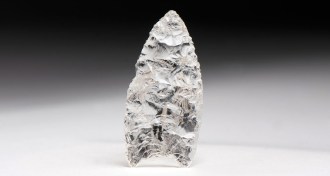 Anthropology
AnthropologyClovis people may have hunted elephant-like prey, not just mammoths
The ancient American Clovis culture started out hunting elephant-like animals well south of New World entry points, finds in Mexico suggest.
By Bruce Bower -
 Neuroscience
NeuroscienceHeavy marijuana use may affect dopamine response
People who regularly smoke five joints a day had dampened reactions to the chemical messenger dopamine.
-
 Health & Medicine
Health & MedicineHIV reemerges in ‘cured’ child
The discovery spotlights limits in detecting the clandestine germ and raises questions about whether HIV can ever truly be cured.
By Nsikan Akpan -
 Health & Medicine
Health & MedicineGiving kids a spoonful of medicine: not what the doctor ordered
It’s frustratingly easy to give your kid the wrong dose of medicine.
-
 Anthropology
Anthropology‘Kidding Ourselves’ shows the rational side of self-deception
Author Joseph T. Hallinan explains why people believe the darnedest things.
By Nathan Seppa -
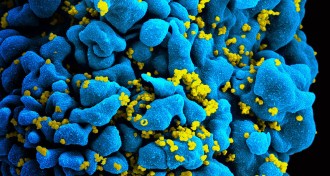 Health & Medicine
Health & MedicineHIV returns in girl once considered cured of the infection
An infant girl, once thought to be cured of HIV, now has detectable levels of the virus.
-
 Health & Medicine
Health & MedicineBabies are kinder after you dance with them
Babies who grooved in sync with an adult were more likely to be little helpers later.
-
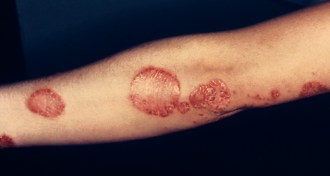 Health & Medicine
Health & MedicineTwo genes clear up psoriasis and eczema confusion
Psoriasis and eczema are often mistaken for each other, leading to mistreatment. Testing just two genes could eliminate this confusion.
By Nsikan Akpan -
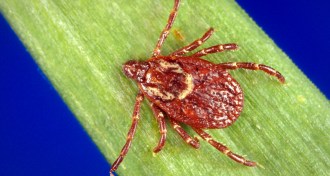 Health & Medicine
Health & MedicineYet another reason to hate ticks
Ticks are tiny disease-carrying parasites that should also be classified as venomous animals, a new study argues.
-
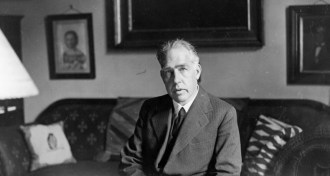 Quantum Physics
Quantum PhysicsQuantum math makes human irrationality more sensible
Vagaries of human decision making make sense if quantum math describes the way the brain works.
-
 Health & Medicine
Health & MedicineMold behind 2013 yogurt recall may cause disease
Genome sequencing links a new, virulent strain of mold to the 2013 Chobani yogurt recall.
-
 Science & Society
Science & SocietyMain result of Facebook emotion study: less trust in Facebook
Facebook’s controversial manipulation of emotional posts raises key questions about how to study online behavior.
By Bruce Bower